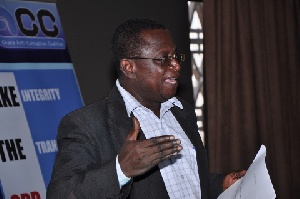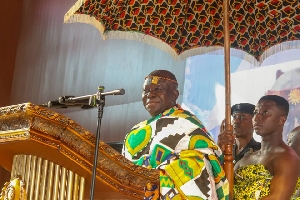General News of Friday, 8 December 2017
Source: peacefmonline.com
EC position on district party offices unrealistic - IDEG
Mr Kwesi Jonah, Senior Research Fellow, Institute for Democratic Governance (IDEG), has described as unrealistic the provisions that enjoin political parties to have offices in all the regions.
Article 55 of the 1992 Constitution and Political Parties’ Law 2000, (Act 574) mandates political parties to have branches in all the regions of Ghana and, in addition, be organised in not less than two-thirds of the districts in each region.
According to him, the requirement was intended to discourage the growth and development of ethno-regional political parties, drawing support and membership from a particular region or ethnic group.
In an interview with the Ghana News Agency on the sidelines of a two- day project evaluation workshop on Small Political Parties and Multiparty Democracy in Ghana (SPMDG) project, Mr Jonah said the provisions had become impractical, repressive and misinterpreted.
He said those inclined to use the provision as repressive instrument had construed the provision to mean that parties should operate actual offices in two-thirds of the country’s administrative districts.
Mr Jonah said the number of districts had expanded exponentially from 110 in 1993 to 216 in 2016 with 38 more districts to be created soon, and that the small parties could not open offices in all districts anytime the number shot up.
He said IDEG and Radikale Venstre of Denmark with support of the Danish Institute for Parties and Democracy designed and implemented the SPMDG project as a pilot phase between February 2016 and December 2017.
The project was to build the capacity of small political parties, help them to enhance the mobilisation of more members in particular women and youth and support them to win more seats in Parliament.
He said the Institute was of the view that the rise of small political parties would reduce the monopoly of the duopolistic parties and strengthen the multiparty governance system.
Mr Jonah noted that though many parties had registered with the EC, two political parties-the National Democratic Congress (NDC) and the New Patriotic Party (NPP), have become the main dominant parties in the country.
Touching on the achievement of the project, he said the project provided platform for small parties to voice their concerns about crucial national issues, build a sense of solidarity and defend the cause of democratic values.
Mr Ewald Garr, Project Officer, IDEG, said as part of the activities for the project, the institute had organised programmes such as agenda setting meeting, workshop on manifesto preparation for the smaller parties, advocacy and public education support for small parties to disseminate information about their manifestoes.
He said the Institute also organised parliamentary candidate debates for small parties in selected regions to reach out to and engage the voters on their manifesto, and workshop on credible elections and peace building activities to contribute to peaceful elections in 2016.
The small parties commended IDEG and its partners for supporting them to build their capacity to effectively play their public service role in influencing political opinion in the country’s democratic governance system.
Mr Aziz Gomda, the Deputy Communication Director for Convention People’s Party, urged the media to give a fair representation of political discussions to the smaller parties and not only limit it to NDC and NPP parties.
Mr John Ameka, the Vice Presidential Candidate for the Great Consolidated Popular Party urged the smaller parties to form an alliance to speak as one voice on issues of national interest.













